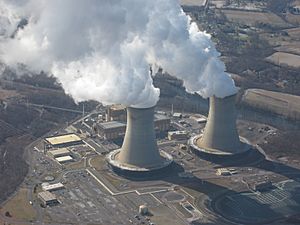Limerick Generating Station facts for kids
Quick facts for kids Limerick Generating Station |
|
|---|---|

NRC image of Limerick Generating Station, Units 1 & 2.
|
|
| Country | United States |
| Location | Limerick Township, Montgomery County, Pennsylvania |
| Coordinates | 40°13′36″N 75°35′14″W / 40.22667°N 75.58722°W |
| Status | Operational |
| Construction began | June 19, 1974 |
| Commission date | Unit 1: February 1, 1986 Unit 2: January 8, 1990 |
| Construction cost | $7.246 billion (2007 USD, Unit 1 only) |
| Owner(s) | Exelon |
| Operator(s) | Exelon |
| Website Limerick Generating Station |
|
The Limerick Generating Station is a large power plant in Pennsylvania. It sits next to the Schuylkill River in Limerick Township, Montgomery County. This location is northwest of the city of Philadelphia.
The power plant uses two special machines called boiling water reactor (BWR) units. These units create electricity using nuclear energy. Huge cooling towers, shaped like giant hourglasses, help cool the plant. These towers use natural air currents to work.
Together, the two units at Limerick can make over 1,200 megawatts of power. This is enough electricity to power more than 2 million homes! A company called Exelon Corporation owns and runs the plant. The Limerick Generating Station usually runs at full power all the time. It only stops for short times when it needs new fuel. The plant connects to the main power grid using very strong transmission lines.
For backup power, the station has eight large diesel generators. These generators can produce a lot of electricity very quickly. They can reach full power in just ten seconds if needed.
The tall cooling towers at Limerick Generating Station are easy to spot. You can see them from many miles away in nearby counties like Montgomery, Chester, and Berks. On a clear day, you might even see them from the One Liberty Observation Deck in Philadelphia.
People Living Near the Plant
The Nuclear Regulatory Commission (NRC) is a government group that makes sure nuclear power plants are safe. They set up two special safety zones around plants like Limerick.
The first zone is for "plume exposure." This area goes out about 10 miles (16 km) from the plant. It's mainly about protecting people from breathing in any radioactive material if there was an accident.
The second zone is for "ingestion." This area stretches out about 50 miles (80 km). It focuses on making sure food and water are safe from contamination.
In 2010, about 252,197 people lived within 10 miles of the Limerick plant. This number grew by almost 19% in ten years. Within 50 miles, there were over 8 million people in 2010. The big city of Philadelphia is about 28 miles away from the plant.
A Look at History
Plans to build the Limerick Generating Station were first announced in 1969. The Philadelphia Electric Company, now known as PECO Energy, chose the site. It is located about one mile south of Sanatoga, PA.
There were some protests from community groups and other delays. Because of this, construction by the Bechtel Power Corporation did not begin until June 1974.
Limerick Unit 1 started producing nuclear power for the first time on December 22, 1984. This is called achieving "criticality." It began working commercially on February 1, 1986.
Limerick Unit 2 also reached criticality on August 1, 1989. It started commercial operation on January 8, 1990.
In May 2006, President George W. Bush visited the Limerick Generating Station. He came to talk about nuclear power and its role in the country's energy plans. He took a tour of the plant, including the control room.
On October 20, 2014, the Nuclear Regulatory Commission (NRC) gave permission for the Limerick units to run for another 20 years. Unit 1 is now allowed to operate until 2044, and Unit 2 until 2049.
On June 1, 2016, Unit 2 of the station had an electrical problem. This caused the reactor to shut down safely from full power. The plant went through a normal shutdown process.
Earthquake Safety
The Nuclear Regulatory Commission studies the risk of earthquakes at nuclear power plants. In August 2010, they estimated the chance of an earthquake strong enough to damage the reactor at Limerick was very low. It was about 1 in 18,868 each year.
After a major nuclear event in Japan in 2011, called the Fukushima nuclear disaster, regulators decided to check plants like Limerick even more closely for earthquake risks.
There is a rock quarry nearby that sometimes uses explosives for blasting. However, this is always done with permission and coordination from the power plant staff to ensure safety.
Images for kids
See also
 In Spanish: Central nuclear de Limerick para niños
In Spanish: Central nuclear de Limerick para niños
 | Roy Wilkins |
 | John Lewis |
 | Linda Carol Brown |


